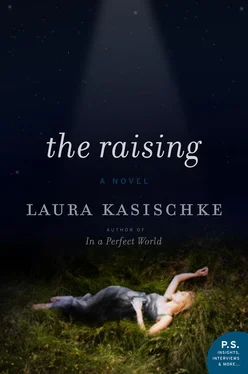“Nicole Werner,” Ellen Graham said. “That accident happened the night my daughter disappeared.”
Shelly nodded, although the accounts she’d read put the disappearance of Denise Graham at least a week before Nicole’s death.
“I’m not a professional in any way,” Shelly continued, “and I probably have no business—”
Ellen began shaking her head. “I don’t care about that,” she said. “I don’t care about anything except finding Denise. Who cares about being professional or even polite? That’s gotten us nothing. We don’t care if you’re just plain nosy, if it’s morbid curiosity. We just want someone to help us.”
Ellen Graham’s hands went to her knees then. She began to scratch at them absently, rocking back and forth.
Shelly paused, trying to decide where to go from here. She took a breath and said, “I was the first person at the scene of the accident. Nicole Werner’s accident. I saw what happened, and I know that what they’re saying happened didn’t happen. I’m trying to find out what actually did happen. I don’t know if it had anything to do with your daughter—”
“Denise,” the woman said, as if she’d been waiting for an excuse to say the name.
“Yes,” Shelly continued, “with Denise. But I know, now, that either the university, or the police, or the newspaper, or the sorority, or all of them together are willing to lie. They’re covering something up. They’ve got something to hide. They’re—”
“Who is this girl, the one you know from the sorority? Is her name Josie Reilly?” There was no mistaking the tone of Ellen Graham’s voice when she said the name: bitter hatred. Fury, and anger, and derision.
“Yes,” Shelly said, astonished. “How did you know?”
“I’ll show you how I know,” Ellen Graham said.
Although she stood up, her body seemed to retain the shape of the sofa, the posture of someone who’d been sitting in it, slumped, so long that she had become it. Shelly followed her to the stairway, where there was more plush carpet and piled-up debris—magazines, paperbacks, unopened envelopes. Ellen Graham simply stepped over the piles and around them, so Shelly did as well, and then they were in a long hallway hung with photographs of a girl who had to be Denise: Denise in a bassinet, zipped into what looked like a lacy pink envelope. Denise with pigtails, riding a tricycle. Denise in a startlingly low-cut blue satin gown, hand tucked under the arm of a boy in a tuxedo. Denise squinting into sunlight, wearing a mortar board.
They stopped in front of an open door.
“This is Denise’s room,” Ellen Graham said, as if Shelly could have mistaken it for anything else.
There were piles of stuffed animals on the bed—the prized, expensive kind of stuffed animals (endangered species with personalized name tags and hand-painted glass eyes), not the dragged-through-the-mud-since-preschool kind. There was a complete set of the World Book Encyclopedia on the bookshelf, ceramic cats holding the volumes in place. The only mess in this room was on the bulletin board, which was three layers thick with snapshots of adolescents in bikinis, or on bicycles, or driving boats, or singing into microphones, and glossy pages torn out of magazines, greeting cards emblazoned with YOU’RE THE BEST and WAY TO GO, GIRL, and small, dried-up things that must have been mementos from parties and dances and dates.
The girl’s violin was out of its case, lying on its side on top of her dresser.
“I haven’t changed anything,” Ellen Graham said. “Before the police came, I made a chart of everything, where everything had been, so that everything would be exactly the way she left it, for when she comes back.” She looked with unnerving ferocity into Shelly’s eyes, seeming to be making sure Shelly understood that Denise would come back . “The only difference is that I put her clothes and things from her room at the sorority away, in her closet, when those girls brought me her things. “See?”
Ellen Graham led Shelly to a closet and slid the door open. A row of white lights blazed on without any switch being flipped, and Ellen Graham stepped into it—into that light, and into that closet—turned a corner, and seemed to disappear before Shelly’s eyes.
Shelly followed, but hesitated, and then she realized that this closet was the size of most rooms. A closet the size of a small apartment, or a trailer. It could not have been called, even, really, a walk-in closet. It was a space that could have been lived in. The only thing closetlike about it was the row after row of garments crammed together along the walls, and the fact that there were no windows.
Ellen Graham turned to look at Shelly and then tossed her arms up in the air, as if either to reveal something miraculous or to try to express the total futility of some unending task, and then she stood up on her tiptoes and pulled down a small black-enameled box, opened it, and turned it toward Shelly, as if to present her with the contents.
Black satin, bearing jewelry.
A pair of earrings.
Two grapelike clusters of opals and rubies dangling from elaborate Victorian-scrolled gold settings. These were the kinds of jewels that were kept under glass at Holyrood or Buckingham Palace. When Denise had worn them, they must have hung down to her shoulders. They must have weighed a ton, cost a fortune.
Ellen Graham picked one of them up and said, “They were my grandmother’s. She was Italian. A countess. You don’t have to believe me. You can look it up on the Internet.”
Shelly nodded, and immediately regretted it, thinking the nod might make it appear that checking out Ellen Graham’s grandmother’s pedigree on the Internet was something she planned to do.
“I let Denise borrow these for the Spring Event. She was wearing a white dress we bought together in Chicago. She was so excited. I’d never even let her touch these before.
“My daughter is an angel, Shelly, but no one could claim that, when it comes to material things, she’s overly responsible. She lost four cell phones between her senior year in high school and when she disappeared.
“Still, she knew what these were worth, and what they meant.”
The Spring Event. Josie’s description of it. The tequila. The coffin. Shelly wondered if Denise disappeared before or after.
“And that fucking little bitch ,” Ellen Graham said, her voice cracking on the last word before she snapped the enameled box shut and tossed it back on the shelf above her daughter’s sweaters and dresses. “Josie Reilly! That fucking little bitch who came here with one of those other little Omega Theta Tau brats with a trunk full of my beautiful daughter’s things. But no earrings. No white dress. ‘Where are those?’ I asked. How stupid was I?”
Ellen Graham was acting out a scene now, reading from a script.
“‘Have you seen, by any chance,’ I asked, ‘a white dress and a pair of beautiful Italian earrings worth about twenty thousand dollars?’
“‘Oh, no , Mrs. Graham. Golly. We went all through Denise’s stuff. We brought you everything! We never saw a white dress or any Italian earrings. Denise was long gone before the Spring Event. Maybe she was wearing them when she left?’”
Shelly watched, waited for the scene to play itself out.
“Well, that didn’t make sense, did it, Shelly? Why would Denise be wearing her Spring Event outfit if that was still three nights away? But, you know, I was confused. I was desperate. The police and the university and the Pan-Hellenic Society—everyone was looking into this. Everyone was working so hard. Wearing ribbons. Making phone calls. I just felt grateful not to be Nicole Werner’s mother by that time. That mother had it worse than I did, I thought. I felt lucky anyone cared at all about Denise’s disappearance with that on top of it.
Читать дальше












